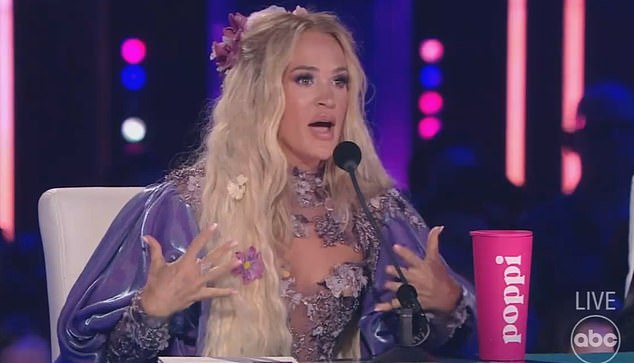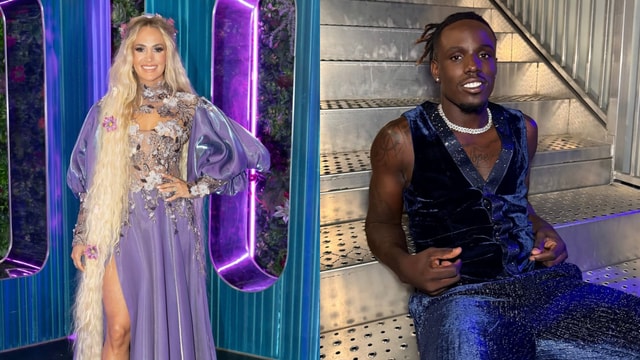American Idol Fans Furious Over Carrie Underwood’s Bizarre Comments to Finalist Jamal Roberts as Top 3 Announced
Meta Description: American Idol fans are expressing their outrage after Carrie Underwood made controversial comments to finalist Jamal Roberts during the Top 3 announcement. As a soulful singer, Roberts received unexpected criticism, revealing deeper issues of bias and expectations in talent competitions.
The Controversial Comments That Sparked Outrage
Carrie Underwood, the renowned country singer and judge on the popular singing competition program *American Idol*, has stirred a significant backlash among fans due to her unexpected comments directed at finalist Jamal Roberts. This incident occurred during the live broadcast when the Top 3 finalists were announced, creating a heated discussion on social media platforms.
During the episode, Roberts, the only remaining Black contestant, performed the classic song “Ain’t No Mountain High Enough.” His rendition was met with enthusiasm and applause, earning him a standing ovation from fellow judges Luke Bryan and Lionel Richie. However, Underwood’s reaction stood in stark contrast as she remained seated while offering critiques after his performance.
Underwood told Roberts that he needed to “move around and entertain” while singing. Many fans found this remark inappropriate, especially since other contestants had enjoyed static performances without receiving similar feedback. This seemingly unequal treatment highlighted the underlying issues surrounding bias in talent competitions and left many viewers questioning Underwood’s intent.
Viewer Reactions and Social Media Backlash
The reaction from the audience was swift and intense, with numerous fans taking to social media to express their disappointment and frustration. Comments flooded platforms like Twitter, where viewers rebuked Underwood’s criticism and raised concerns about its implications for Roberts. Several fans suggested that her remarks seemed dismissive, given that no other contestants were subjected to the same level of scrutiny for their performance styles.
In addition to critiquing Underwood’s comments, fans noted the disparity in how judges evaluate contestants based on their performances. Comments on Twitter ranged from disbelief at Underwood’s perceived bias to calls for her not to return as a judge for future seasons of the show. This incident has initiated discussions about the expectations placed on different performers and the impact of race and genre on judging decisions in singing competitions.
Broader Discussions on Performance Style and Authenticity
The uproar surrounding Underwood’s comments has led to a broader dialogue about performance styles in talent competitions. For years, contestants on *American Idol* and similar shows have been judged not only on their vocal abilities but also on their stage presence and energy. However, the standards for what constitutes an engaging performance can vary widely depending on the genre and individual preferences of judges.
Some fans argue that soulful singers like Jamal Roberts should not be pressured to conform to a specific performance style that doesn’t align with their artistic identity. Critics of Underwood’s remarks contend that it is crucial for judges to appreciate and respect the authenticity of each contestant’s unique sound and style, rather than imposing uniform expectations.
This incident also raises questions about the role of race in performance criticism. As the last Black contestant remaining in the competition, Roberts’s experience has led many to wonder whether his performance was scrutinized more heavily than those of his peers. This aspect of the conversation underscores the importance of fostering an inclusive environment that recognizes diverse artistic expressions without bias.
As Jamal Roberts celebrates his place in the Top 3 and prepares for the upcoming finale scheduled for May 18, the conversations ignited by Carrie Underwood’s comments will likely continue to resonate among fans and within the broader context of talent shows. How judges evaluate performances, offer critiques, and interact with contestants is crucial in shaping the experience for both the artists and the audience.
As the season progresses, viewers will be watching closely not only for the talent showcased in the finale but also for how judges approach their roles in nurturing that talent. With the growing influence of social media, fans have an unprecedented platform to amplify their voices and advocate for more equitable practices in judging and mentoring on entertainment shows like *American Idol*.
This ongoing debate emphasizes the need for sensitivity and understanding in the world of music competition shows, reminding us that every artist deserves recognition and support in their own right, free from biases and preconceived notions about performance styles.





